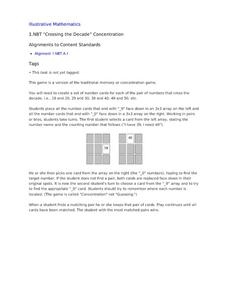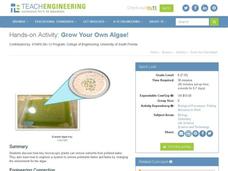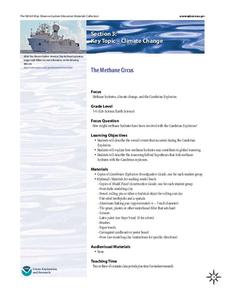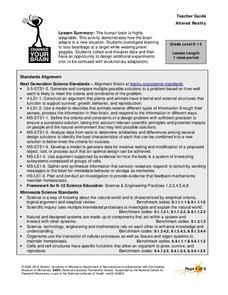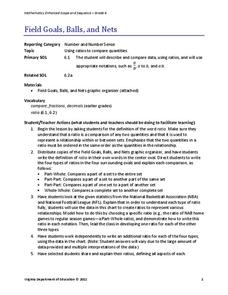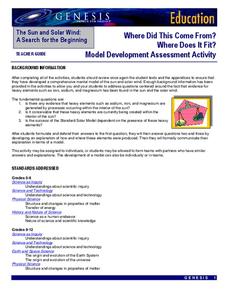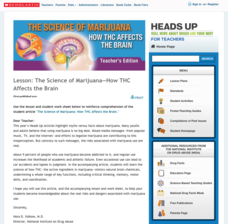Curated OER
Acronyms--Characters in The Hobbit
Have your class create acrostic poems for characters in The Hobbit. First, define acronyms and work together to complete sample acronyms for their own first names. Learners then research specific characters in the novel and create...
Curated OER
Understanding Core Values Using the Frayer Model
Students complete the Frayer Model. In this literature lesson, students review the concept of theme in literature. Students identify major themes in books they've read. Students learn the attributes of the Frayer Model and then complete...
Curated OER
What is the Federal System Created by the Constitution?
Explore the unique structure of the federal system of government in the United States. Class members will learn about how most nations were organized before the establishment of the Constitution, how power is currently divided between...
Curated OER
ASL Lesson 17
Learn to communicate with sign in this comprehensive series. It includes a video, images to help you sign, a quiz, and multiple practice sheets, all of which are intended to communicate wants, needs, and personal preferences. The video...
Curated OER
Comprehension: Create a Summary from an Expository Text
Children can learn to analyze expository or informational texts at nearly any age. This scaffolded and scripted resource provides teachers with the support needed to facilitate a thoughtful lesson on summarizing informational text by...
Curated OER
The Giver: Lesson 1
Do “memories need to be shared?" Are “memories…forever?" Would you give up memory to live in a perfect world? Introduce a unit centered on Lois Lowry’s utopian/dystopian novel The Giver with a series of activities that has groups...
Curated OER
Energy Balance in Your Life
How do young learners figure out how to balance their energy in and their energy out? The main thing to understand is calories. How many calories are in foods and beverages consumed and how many calories are burned off by physical...
University of Arizona
Identity Repair
In a detailed, creative writing task, potential poets analyze how race, identity, and society categorize and (mis)represent us. The learning begins with an imaginative anticipatory set where students describe unique situations that their...
National Center for Case Study Teaching in Science
In Sickness and in Health
Based on family history, how likely is it that a couple's children will have a recessive disease? In an in-depth, but easy-to-follow case study, future geneticists learn the story of Greg and Olga, who are hoping to have children, but...
EngageNY
Writing a First Draft: Accessing Books Around the World Informative Paragraph
Supervise the final drafting of a well-organized paragraph by following the steps outlined in this plan. Using the included sample paragraph as a model, class members brainstorm criteria for quality work and then compose their paragraphs...
Illustrative Mathematics
“Crossing the Decade” Concentration
Young mathematicians concentrate on learning to fluently count. Following the rules of the classic game Memory, children take turns flipping over cards in order to find pairs of numbers that cross a decade (e.g. 29 and 30). For younger...
Curated OER
Reading Readiness
Develop the reading and vocabulary skills of young learners with this simple fill-in-the-blank worksheet. Using the provided word bank, children read and complete a series of five sentences by writing in the...
EngageNY
Complex Numbers and Transformations
Your learners combine their knowledge of real and imaginary numbers and matrices in an activity containing thirty lessons, two assessments (mid-module and end module), and their corresponding rubrics. Centered on complex numbers and...
Visa
In Trouble
What are some of the financial risks associated with using credit? Pupils learn the warning signs of incurring financial hardship, and through PowerPoint presentations, worksheets, and discussion, discover the implications of such events...
K-5 Math Teaching Resources
Adding Mixed Numbers (Unlike Denominators)
Mix things things up in your elementary math class with a series of problem-solving exercises. Presented with a series of mixed number word problems, young mathematicians are asked to solve them by using either visual fraction models or...
It's About Time
A Running Start and Frames of Reference
Ttake learning to the next level! Individuals research inertial mass, a physical property of matter, and apply what they learn through a series of activities designed to stimulate the senses. They demonstrate Galileo's Principle of...
University of Colorado
Planetary Distances on the Playground
Earth is 149,600,000 km, or 92,957,130.4 miles, from the sun. Young astronauts create an interactive model to learn the distances between planets. Nine groups, each representing a different planet, are spread around at class-calculated...
Teach Engineering
Grow Your Own Algae!
Develop a model of a wastewater treatment center. The last activity of the unit has pupils mix a lake water sample into a tank of water containing fertilizers. Over time, the algae from the lake water grows and removes the nutrient-rich...
NOAA
The Methane Circus
Step right up! An engaging research-centered lesson, the third in a series of six, has young archaeologists study the amazing animals of the Cambrian explosion. Working in groups, they profile a breathtaking and odd creature and learn...
University of Minnesota
Altered Reality
Fascinate young life scientists by showing them how their brain learns. By using prism goggles while attempting to toss bean bags at a target, lab partners change their outlook on the world around them, producing amusing results....
Virginia Department of Education
Field Goals, Balls, and Nets
Score a resource on ratios. Young mathematicians learn about different ways to express ratios. Using sports data, they write statements about the statistics in ratio form.
Roald Dahl
Matilda - Arithmetic
Mr. Wormwood, one of the characters in Roald Dahl's Matilda, is not the most trustworthy of characters. Have student groups take on the roles of car salespeople and play a game to see who can make the most profit by selling refurbished...
NASA
Model Development Assessment Activity
Time to show off what they've learned! The final lesson in the series of six asks young scholars to process their learning from the previous lessons. They identify possible elements of the sun as well as a possible origin.
Scholastic
The Science of Marijuana—How THC Affects the Brain
Marijuana can affect every part of a user's life—starting with the delicate nervous centers of the brain. An informative article and worksheet prompt teenagers to learn more about how the THC found in most forms of marijuana can...
Other popular searches
- Science Learning Centers
- Math Learning Centers
- Hands on Learning Centers
- Measurement Learning Centers
- Space Learning Centers
- Literacy Learning Centers
- Alphabet Learning Centers
- Ideas for Learning Centers
- Electricity Learning Centers
- Hand Math Learning Centers
- Easy Math Learning Centers
- Planet Learning Centers












